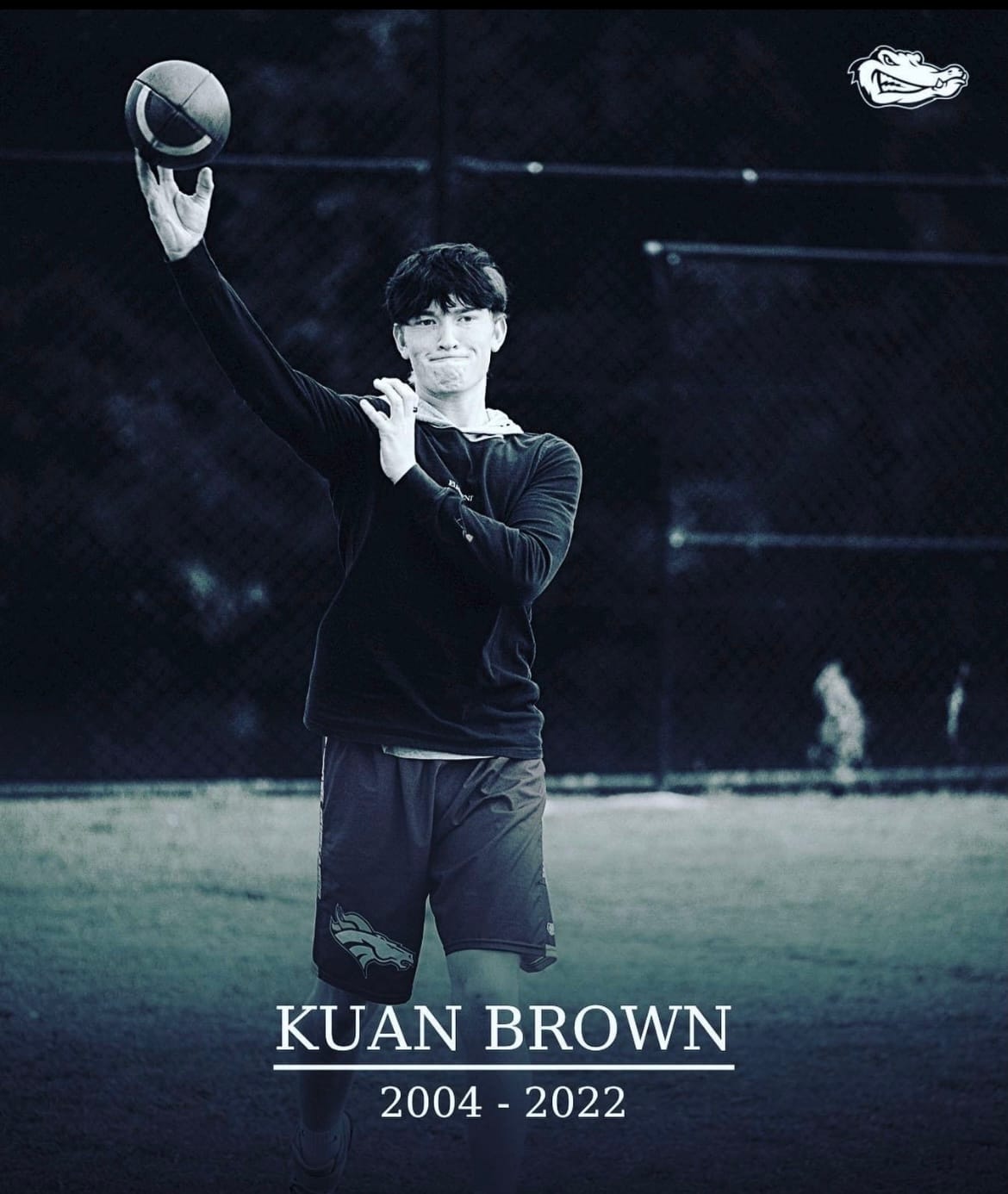A match to honour 18-year-old Sepsis victim Kuan Brown, and a father's warning to us all
On Saturday, 8 November, at Wollongong's Vikings Oval, two gridiron teams that 18-year-old Kuan played for will come together in his memory, in a contest for the second Kuan Brown Memorial Shield. The match between the Wollongong Mustangs and the UTS Gators kicks off at 5pm and entry is free
One day, Kuan Brown was a happy, healthy teenager. A budding sporting champion with an ambition to play college gridiron football in the United States. Just eight days after telling his parents he was feeling unwell, Kuan passed away, due to undiagnosed Sepsis.
On Saturday, 8 November, at Wollongong's Vikings Oval, two gridiron teams that 18-year-old Kuan played for will come together in his memory, in a contest for the second Kuan Brown Memorial Shield. The match between the Wollongong Mustangs and the UTS Gators kicks off at 5pm and entry is free.
Kuan's father, Duncan, says his family has been overwhelmed with the love and support they've received – and continue to receive – since the passing of their only son just over two years ago.
"Kuan had ADHD, and as a result he had low self-esteem," Duncan said. "He honestly didn't believe he had many friends, but 550 attended the celebration of his life. If only he knew when he was alive how many friends he actually had.
"In many ways, his loss has helped bring the community together, and that's exactly what's happening with the memorial game this weekend."
Match an enduring legacy to Kuan
The organisers say "this match brings two rivals together with a shared vision of respect, solidarity and remembrance, as they pay tribute to the enduring legacy of Kuan Brown".
Kuan joined the Wollongong Mustangs in 2019 when he was just 15 and went on to play quarterback for the Colts team in 2020. He then joined the UTS Gators for the 2021 and 2022 seasons, but he continued to also train with the Mustangs and maintained close friendships with many of the Mustangs family.
During Saturday's memorial match, neither of the teams will wear the No. 1 jersey, which was Kuan's number. His parents, Duncan and Joelene, will have that honour for the day.


Kuan was an all round sports star representing at hockey, rugby union and cricket as well as starring at gridiron. Right: A family portrait of Kuan with his sister Kaira, and mum and dad, Jolene and Duncan.
A hugely talented young sportsman, Kuan also played representative hockey, rugby union and cricket. But it was gridiron football that was his first love and passion, according to his father.
"Everybody involved in coaching Kuan said he was a rare talent and had an 'X factor' that couldn't be taught," Duncan said. "His Wollongong Mustangs coach, Jordy Starker, played college football in the United States and would often say that Kuan had the talent and skill to make it at that level. Kuan's ambition was to play college football in the US in 2023, and he was absolutely dedicated to his training to make that happen."
Father dedicated to raising Sepsis awareness
Tragically, he never got the chance to realise his dream. Kuan passed away in August 2022, and Duncan is now dedicating much of his life to honouring his son's memory and legacy and raising public awareness of the dangers of Sepsis.
"We still have no idea where he picked up the bacterial virus, and that's the thing with Sepsis, you can get it from anything – dental work, a dog bite," Duncan said.
"Sepsis is your body's reaction to the infection. None of us knew how sick he was, even the doctors apparently. We had never heard of Sepsis. One of the symptoms is the feeling like you're going to die. On the weekend before he passed, Kuan was lying with his mum and he asked, "Am I going to die?"
Still feeling – but trying to manage – the anger and frustration two years after Kuan's death, Duncan regularly agrees to speak about his family's experience, and he has joined the Global Sepsis Alliance to increase understanding about the illness across the world.

His death 'was avoidable'
"The most difficult sentence we have ever had to read has to have been 'The death of Kuan Brown was avoidable', as it appeared in the Medical Examiner's report," Duncan said.
"It was all so sudden. Kuan played football on the weekend. On Monday, he started feeling unwell, and by Wednesday he had a temperature, started vomiting and had diarrhoea. We arrived at the emergency department in the early morning of Thursday but after spending seven and a half hours there, we were sent home with a diagnosis that he 'just had a virus' and that we should give him a Panadol and Nurofen and keep him hydrated.
"The reality is that Kuan had bacterial pneumonia and was in the early stages of Sepsis. Five days later he was dead.
"The defining day was the Thursday when we took him to the hospital. It was a day marred by an unimaginable series of hospital failures and poor judgements by medical professionals. The triage nurse told us Kuan was fighting an infection and was being categorised as 'urgent', but it was more than three and a half hours until he was even seen by a doctor.
"She examined him briefly and ordered a reactive protein test, a blood test, and a COVID test. We waited another three hours for the results. We were told the blood results simply showed a viral infection with no further treatment required. We left the hospital mid-afternoon, more than seven hours later, with the clear impression that this was not anything serious.
"What emerged after Kuan's death was the extent of information that we were NOT told at the time. Information that was disclosed in the clinical governance investigation report months later, that we believe would almost certainly have saved Kuan's life, had we been aware of it. The report told us that Kuan was triaged 'Category 2', which as per the Australian Triage Scale, is given to people who need to have treatment within 10 minutes and have an imminently life-threatening condition.
'Never received a satisfactory explanation'
"Had we been told this and understood what it meant, we would not have waited patiently for three and a half hours to be seen by a doctor. We have never received a satisfactory explanation for why this happened, other than there was an overwhelming number of patients present in the emergency department at the time.
"The most concerning finding in the report was that when triaged, Kuan had clearly met the criteria for Sepsis as per the NSW Health Adult Sepsis Pathway, with an onset of fever, cough and breathlessness, including two 'Yellow Zone' criteria of an elevated heart rate of 137 bpm and a raised temperature of 39.2 degrees. This should have triggered an immediate response for the medical team to follow the Sepsis pathway. It did not."
Duncan said when a patient presents with two 'Yellow Zone' criteria lactate levels should have been collected and blood cultures measured.
"This would have saved Kuan's life."
Remembering Kuan's final days
To emphasise the importance of early diagnosis and treatment, Duncan shared his recollections of the days that followed Kuan's discharge from the NSW public hospital on Thursday, 18 August 2022.
Those first three days "he didn't improve but also never really deteriorated. On the Monday evening he even had dinner at the table with us – granted he didn't eat much. On Tuesday morning (23 August) he took a bad turn, said he was feeling terrible and his skin had become a mottled grey, another Sepsis symptom. Jolene tried to get an appointment with our local GP that morning but couldn't get in until around 3.30pm. But by that time he was almost unable to walk to the car. He couldn't make it to the GP's office, so they saw him in the waiting room and immediately called an ambulance which arrived around 4pm. He passed away at 8.08pm that evening."
Duncan said after receiving the 'Significant Adverse Event Report' the systemic and cultural failures that resulted in Kuan's death became very evident.
"Kuan's death was entirely avoidable and that's when the frustration and anger emerged," Duncan said. "I was able to harness my anger as a source of motivation and started sharing his story to raise awareness and do whatever I can to protect other families."
Duncan has spoken of his family's tragic and heart-breaking experience at many conferences and was invited to join the Global Sepsis Alliance.


Kuan on holidays with his sister, Kaira.
Many tributes honour Kuan's contribution
Duncan agreed to speak with The Illawarra Flame as part of his ongoing efforts to educate about Sepsis and its high risk. He also wanted to thank those involved in organising this weekend's memorial match and the many tributes that honour Kuan's memory. It is clear the pride he has for his son who "was happiest when he was with friends and playing sport" is stronger than ever.
"Robertson Junior Hockey Club created a perpetual award, the Kuan Brown Most Outstanding Junior Player Award, the award that Kuan won in 2019," Duncan said. "They've also created the KB Kindness Awards to a player in each age group. The words on the back of the award says: 'Inspired by the generous and selfless nature of Kuan who was always there for his friends and teammates. The award pays tribute to those who embody his legacy of unwavering support, kindness and unity both on and off the field'."
The University of Wollongong Hockey Club has renamed the perpetual Junior Club Person of the Year in Kuan's honour.
Instead of retiring Kuan's No. 1 jersey, the Wollongong Mustangs Gridiron Club decided to make it an annual award. Players get to choose their numbers for the season, but the No. 1 jersey is now presented to a player who embodies the values and passion Kuan had for the game.
The UTS Gaters Gridiron Club retired Kuan's No 1 jersey and created an annual Kuan Brown Memorial Award, "to honour not only the legacy of Kuan but also everything he stood for – mateship, sportsmaship, good times, winning and dedication," said Courtney Scarth, the UTS Colts' head coach.

A family's pride
Duncan said the Brown family was extremely proud of Kuan's contribution to the world during his all-too-short 18 years.
"Kuan had an enormous impact on so many people during his short life. He invested time in other people and lived his life in such a way that he was a blessing to everyone who knew him," Duncan said.
"One of his school friends captured the essence of Kuan in her tribute when she said: "Kuan cared for the people around him more than most knew. There is something truly special about a person who can share their passion and their love in ways that push others to try and achieve the same."
"He was loved and is now deeply missed by so many. We will continue to fight for more protection for others in a similar situation – because this is what he would have wanted," Duncan said.

Footnote: Duncan Brown is a board member of the Multicultural Community Council of the Illawarra and he encourages anyone from the local multicultural community who has never witnessed a game of gridiron to come along to Saturday’s memorial event.






